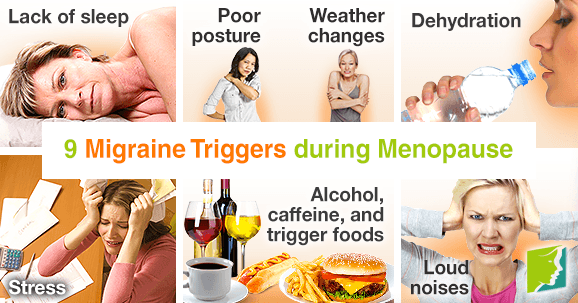Migraine symptoms affect around 29.5 million Americans. The leading cause of menopausal migraines in women is hormone fluctuations. Migraine headaches are generally described as a recurrent, throbbing pain that starts on one side of the head. During menopause, hormone levels fluctuate, which can cause inflammation and blood vessels in the brain to dilate and press on nerves. Migraine headaches are much more severe than the more common tension headaches. Migraines can also cause nausea and vomiting, and last anywhere from several hours to several days. Keep reading to learn more about migraine triggers during menopause.
Lack of Sleep
Insufficient sleep can make the body more vulnerable to menopausal symptoms, like migraines and fatigue. The average adult needs around seven to eight hours of sleep every night in order to stay healthy and have enough energy during the entire day.
Stress
High stress is one of the most common migraine triggers. Stress allows tension to build up and weakens the body, making it vulnerable to illnesses. Yoga, walking, or swimming are all excellent stress reducers.
Dehydration
This may seem like an obvious trigger, but many people are unaware that they are dehydrated on a daily basis. The standard recommended amount of daily water intake is the equivalent of 8 glasses. Staying hydrated helps prevent headaches.
Alcohol
It is common knowledge that drinking excessive amounts of alcohol can cause excruciating headaches the next day (i.e., a hangover). Alcohol also severely dehydrates the body, making it more susceptible to migraines.
Caffeine
Caffeine dehydrates the body very quickly, which is also a leading cause of migraines. Avoid drinking too many cups of coffee or tea during the day to prevent migraines.
Trigger Foods
Foods that contain potential migraine triggers like aspartame, MSG (monosodium glutamate), and tyramine should be avoided as much as possible in order to prevent migraines. Aspartame is commonly found in artificial sweeteners, and MSG is found in fast food, Chinese food, and some spice blends. Tyramine can be found in some aged cheeses and sausages.
Poor Posture
Bad posture allows tension to build up in the neck, head and shoulder muscles, which can cause migraines. Try to avoid slouching or hunching, or cradling a phone between your head and shoulder for too long.
Weather Changes
Even the smallest things can cause migraines, like changes in barometric pressure. Overcast days and bright, sunny days can trigger migraines in sensitive people.
Loud Noises
For people who are prone to migraines, seemingly small things like loud noises, bright lights, and strong odors can trigger a migraine, in addition to making an existing migraine worse.
Women are more susceptible to getting headaches than men, which is most likely due to the hormonal fluctuations experienced during times like menopause, menstruation, and pregnancy. While they are typically caused by hormone fluctuations, they can also be triggered by things like strong odors and stress. It is important to try and reduce stress, exercise regularly, and eat healthy in order to prevent menopausal migraines.
There are 3 main approaches that can help you deal with menopausal migraines.
Sources
- National Health Service UK. (2013). Hormone headaches. Retrieved August 26, 2014, from http://www.nhs.uk/livewell/headaches/pages/hormonalheadaches.aspx
- National Health Service UK. (2012). Migraine - causes. Retrieved August 26, 2014, from http://www.nhs.uk/conditions/migraine/pages/causes.aspx
- Office on Women's Health. (2012). Migraine Fact Sheet. Retrieved August 26, 2014, from http://www.womenshealth.gov/publications/our-publications/fact-sheet/migraine.html#n




